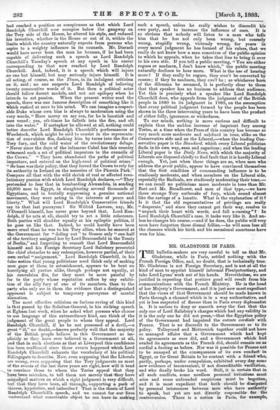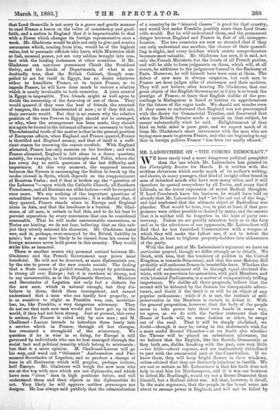MR. GLADSTONE IN PARIS.
THE bulletin-makers are very careful to tell us that Mr. Gladstone, while in Paris, settled nothing with the French Foreign Office, and, no doubt, that is technically true. Mr. Gladstone is not Foreign Secretary, and is not at all the kind of man to appoint himself informal Plenipotentiary, and take Lord Lyons' work out of his hands. Nevertheless, we are justified in expecting that positive good will result from his communications with the French Ministry. He is the head of her Majesty's Government, and it is just now most expedient that the views of that Government should be made known in Paris through a channel which is in a way authoritative, and yet is less suspected of finesse than in Paris every diplomatist is. It is useless to deny or smooth away the fact that the only one of Lord Salisbury's charges which had any validity in it is the only one he did not press,—that the Egyptian policy of the Government had impaired the entente cordiale with France. That is no discredit to the Government or to its policy. Talleyrand and Metternich together could not have so managed affairs that a Government which had kept its agreements as ours did, and a Government which had evaded its agreements as the French did, should remain on as cordial a footing as before. Nor was it possible for France not to be annoyed at the consequences of its own conduct in Egypt, or for Great Britain to be content with a friend who, partly, perhaps, under compulsion, exhibited every day some new evidence of inconvenient, if not discreditable vacillation, and who finally broke his word. Still, it is certain that in all such conflicts, some needless personal irritations must arise and some unfounded suspicions must be begotten, and it is most expedient that both should be dissipated by personal intercourse between men who have authority to speak, but yet are not directly responsible for the controversies. There is a notion in Paris, for example,
that Lord Granville is not sorry in a grave and gentle manner to read France a lesson on the value of consistency and good. faith, and a notion in England that it is impracticable to deal with a Power which changes its foreign representative once a week. Mr. Gladstone would be able not only to give and receive assurances which, coming from him, would be of the highest value, but to persuade officials who have, while Ministries shift so fast, unusual power, yet are very seldom brought into con- tact with the leading statesmen of other countries. If Mr. Gladstone can convince permanent Chiefs like President Grevy, and the heads of Departments, of what is un- doubtedly true, that the British Cabinet, though com- pelled to act for itself in Egypt, has no desire whatever either to humiliate France, or to injure France, or to impede France, he will have done much to restore a relation which is nearly invaluable to both countries. A joint control in Egypt is impossible. Two friends might as well agree to divide the ownership of the door-step of one of them. They would quarrel if they were the best of friends, the sweetest of tempers, the most disinterested of men ; or if they did not, their servants would. But that is no reason why the relative position of the two Powers in Egypt should not be arranged, or why, when the arrangement has been made, they should not again be bound in the informal alliance so necessary to both. The substantial truth of the matter is that in the present position of European affairs, when England and France quarrel, France is throttled and England uneasy, and that of itself is a suffi- cient reason for renewing the entente cordiale. With England alienated, France has only enemies on her borders ; and with France alienated, England is left alone in a dozen quarters, notably, for example, in Constantinople and Pekin, where-she has every day to settle questions of the last difficulty and importance. At this very moment, the supposed tension between the Powers is encouraging the Sultan to break up the modus vivendi in Syria, which depends on the reappointment of Ronstem Pasha ; and if that is broken up, the " question of the Lebanon "—upon which the Catholic Church, all Southern Frenchmen, and all Russians are alike furious—will be reopened once more. We say nothing of the important questions of extradition between the two countries ; it is sufficient that, if they quarrel, France stands alone in Europe and England alone in Asia, and that the loneliness is a burden. Mr. Glad- stone, of all men, is certain to feel this, and to do his best to prevent separation by every concession that can be considered reasonable. That he will make unreasonable concessions, as Tories are hinting, we do not fear, believing that on this sub- ject they utterly misread his character. Mr. Gladstone hates war, and is, perhaps, over-annoyed by the British liability to panic ; but a man less likely to be turned from his course by foreign menaces never held power in this country. They would strike him as immoral.
There is another reason why personal contact between Mr. Gladstone and the French Government may prove most beneficial. He will not be deceived, as most diplomatists are, by the rise to power of the new couche sociale. The feeling that a State cannot be guided steadily, except by gentlemen, is strong all over Europe ; but it is nowhere so strong, not to say unreasonable, as in the Diplomatic Services. Ministers and Secretaries of Legation not only feel a distaste for the new men, which is natural enough, but they dis- believe in them, think them incompetent, and cannot understand that a man who can hardly bow properly, or is as sensitive to slight as Franklin was, can, neverthe- less, be, like Franklin, a very dangerous adversary. They do not see that such new men would not have got up in the world, if they had not been strong. Just at present, this error is serious, for France is ruled only by new men ; and M. Challemel - Lacour intends to introduce them freely into a service which in France, through all her changes, has remained a stronghold of the aristocracy. We question if he is wise in so doing, for Europe is still governed by individuals who can be best managed through the social tact and political tenacity which belong to aristocrats ; but that is a mere opinion. M. Challemel-Lacour will go his way, and weed out " Orleanist " Ambassadors and Per- manent Secretaries of Legation, and so produce a change of tone in all Embassies which will perplex, perhaps irritate, half Europe. Mr. Gladstone will weigh the new men who are at the top with eyes which are not diplomatic, and which have seen " risen " men in high positions before, and will understand them and their objects as the diplomatists do not. Very likely he will approve neither personages nor designs. He has always said publicly that the administration of a country by its "leisured classes " is good for that country, and would fret under Franklin possibly more than Lord Gran- ville would. But he will understand them, and the permanent danger between England and France is, first of all, misappre- hension. The two countries are now so situated that if they can only understand one another, the chance of their quarrel- ling is slight, and every incident which assists comprehension becomes most valuable. Mr. Gladstone has seen, it is said, not only the French Ministers, but the heads of all French parties, and will be able to form judgments on them, which will, at all events, be additions to the judgments formed in the Embassy at Paris. Moreover, he will himself have been seen of them. The defect of new men is always suspicion, but such men in France are keen judges alike of statesmen and their motives. They will not believe, after hearing Mr. Gladstone, that one great object of the English Government in Cairo is to break the prestige of France, or fancy that English dislike of the pro- ceedings in Madagascar is based at bottom on apprehensions for the future of the sugar trade. We should not wonder even if they came to understand that England was not preoccupied with the desire for Commercial Treaties, and discovered that when the British Premier made a speech on that subject, he meant substantially what he said. Enlightenment of that kind on both sides is pure gain, and we expect much of it from Mr. Gladstone's short intercourse with the men who are trying once more to govern France, and who are beginning to say that in foreign politics France has been too nearly effaced."



































 Previous page
Previous page